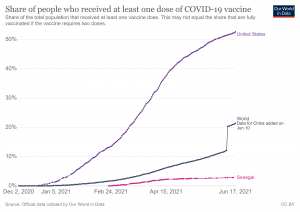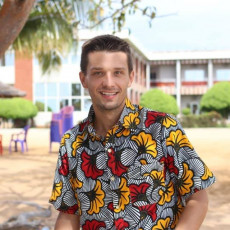As many countries begin their transition into a post-pandemic era, the global disparities in vaccine distribution has become a glaring ethical issue. The inequitable distribution in vaccines continues to leave countries, such as Senegal, in a vulnerable position where the risk of another spike in cases remains an ever-present threat. The effects, however, extend beyond public health and safety.
An increasingly relevant topic, the realities of the pandemic have exacerbated the lack of economic opportunity for Senegalese youth. As covid-19 closures disrupt the global and local economies, migration has become the only option for many. Most people who decide to migrate cite the lack of employment as the primary motivating factor. Met with border closures and strict entry policies, however, many of these individuals remain stuck—at home or abroad—in a precarious situation with no viable prospects.
Accepting the Peace Fellowship in Senegal forced me to grapple with these global inequities directly. While shops, restaurants, and theaters continue to open up in the US with the increase in vaccination rates, Senegal remains in the middle of its pandemic efforts. Most international programs shut down or reduced their in-country staff during the past year and these programs have yet to resume abroad. Speaking with numerous Senegalese contacts about the pandemic and relying on CDC recommendations and WHO data convinced me that now is the right time.
The enthusiasm and expressed need for global support in Senegal indicate a need for the global community to come together and address these disparities—both in public health and economically—that weigh heavily on people’s daily lives. I don’t believe it is my decision to make regarding how or when work will resume in Senegal. Communities will make the best decision for themselves and I have responded accordingly, doing all that I can to amplify their voices and support their work.
Continuing best practices (i.e. wearing face masks, social distancing, and being vaccinated), I believe I can conscientiously and effectively minimize the risks to myself and others while simultaneously amplifying the voices and stories of returned migrants and their families. That said, the global community and Senegal have a lot of work to do before Senegal can begin to look beyond the pandemic.

Source: Our World in Data
To-date, only 3 percent of the Senegalese population has received a vaccine against covid-19. Contrasted with the world and US vaccine percentages (21 percent and 53 percent, respectively) it is clear that the pandemic continues to disproportionately affect Senegal, and other countries with similar barriers to vaccine accessibility. COVAX and ACT-A initiatives promise to close these gaps, but their delayed rollout and lack of transparency call into question the short-term impacts these programs will have in Senegal. During my time in Senegal, I will continue listening to the communities where I work and bring awareness to the issues they face.
Posted By Jeremiah Gatlin
Posted Jun 20th, 2021


2 Comments
Iain Guest
June 20, 2021
Jeremiah, this is a thoughtful and sensitive piece of writing. COVID-19 has turned the most simple decisions – should we wear a mask, get vaccinated etc – into ethical questions because they always affect other people. There is no such thing as an ethically-neutral decision when it comes to COVID-19. Right now, the situation in Senegal seems to be under control, and you seem comfortable with leaving the decision of whether you continue to work to your hosts. Let’s hope it remains that way! Also, I wonder if you see any significant difference between ethical norms in Senegal and the US over these tough questions? Keep up the good work and writing!
Saliha
June 21, 2021
Thanks for this blog, Jeremiah! It is a privilige for me to hear directly from you and the local communities over there! Keep us posted! Look forward to reading your upcoming pieces of writing!